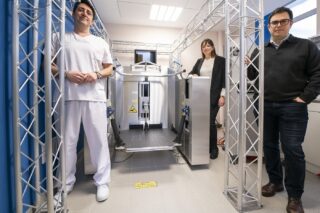British scientists have developed a groundbreaking home test for babies that picks up deficiencies in vital nutrients in the first weeks of life. The simple test requires a pinprick of blood and results are given at the push of a button.
Micronutrient deficiencies can dramatically impact a baby’s health and development, leading to anemia, increased infection risk, impaired growth and vision problems. A deficiency in vitamin K can lead to a rare but life-threatening condition that causes bleeding in the brain.
At the same time, approximately one-third of all babies, and half of Black, Asian and minority ethnic babies, are estimated to be deficient in vitamin D. Traditional micronutrient testing requires a relatively large volume of blood to be sent to a central lab, which is time-consuming and can be distressing for parents and newborns.
A team of health and technology experts at William Oak Diagnostics worked with the UK health service and infant charities to ensure this new test has the most impact on babies and mothers at high risk of deficiencies. Its goal is to allow pregnant and breastfeeding mothers to self-test and pick up any deficiencies that could impact the child.

Alexander Patto, CEO and Co-founder of William Oak Diagnostics, had the idea after his seven-week-old son William died from a brain swelling caused by a complication from a lack of Vitamin K. He and his team in Cambridge are now on a mission to prevent other families suffering from complications stemming from a lack of vital macronutrients shortly after birth. He explained:
“It is very easy to treat deficiencies, you just have to provide supplements at the right time.Theoretically, we can eliminate deficiencies globally if we had the right resources and equipment to do so.”
Scanning For Deficiencies in Several Vitamins
Their new test uses lateral flow technology. For babies, it would be administered by a nurse or health visitor at home in the first few days after birth. A small pinprick of blood is taken and input into the device which is the size of a credit card. The data is relayed to an app, which uses advanced machine learning to analyze the results and flag any deficiencies.
Women could also use the device to test themselves throughout the pregnancy, from preconception to birth and breastfeeding. Iron deficiency and anemia is a leading cause of death in pregnancy worldwide. Alexander Patto said:
“If you were to get a hospital blood test for deficiency it would test for a range of things. So it is important that we do the same and develop a universal test for deficiencies that can be used for maternal and child health.”
Describing the test as a “one-stop shop”, he said it would scan for deficiencies in Vitamin K, D, Iron, Folate and vitamin B12, which are all essential for child development and maternal health. He added:
“We really want to change how this kind of testing is done and make it simpler, less painful and more empowering for families.”
The team hopes to test their latest model of the device at a clinical trial in spring 2024.










